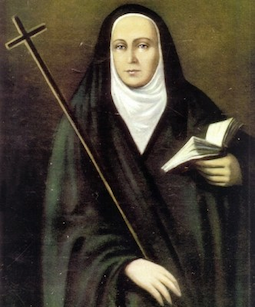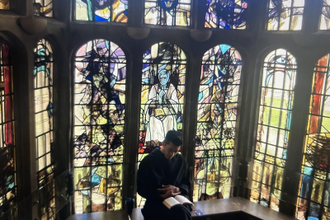Pope Francis canonises Argentina's first woman saint

St María Antonia de San José
Thousands of Argentinians have been in Rome this weekend for the canonisation of their country's first women saint. Sr María Antonia de San José was canonised today in a special Mass in St Peter's Basilica.
Known as 'Mama Antula', Maria lived in Argentina from 1730 to 1799. She founded the Daughters of the Divine Saviour and dedicated her life to evangelisation and care for the poor. At a time when the Jesuit order had been expelled from Argentina, she made it her mission to spread Ignatian spirituality throughout the country.
Among the roughly five thousand present in St Peter's Basilica for the occasion was Javier Milei, the newly-elected president of Argentina.
Towards the end of his homily, Pope Francis laid to one side his prepared remarks and spoke off-the-cuff. He said: "Today we think of María Antonia de San José, 'Mama Antula'. She was a wayfarer of the Spirit. She travelled thousand of kilometres on foot, crossing deserts and taking dangerous paths, bringing God with her."
"Today she is a model of apostolic fervour and audacity for us.. When the Jesuits were expelled, the Spirit lit a missionary flame in her based on trust in providence and perseverance."
"Let us pray today to María Antonia, Santa María Antonia de Paz de San José, that she may help us very much."
The Litany of All Saints rang out solemnly under Michelangelo's dome, then the Pope spoke the canonisation formula. A deacon consecrated the relics of "Mama Antula", and the Gospel was recited in Greek, as is customary on particularly solemn occasions.
During the offertory, Claudio Perusini and his family brought gifts to the altar; the man had been healed by a miracle that took place through the intercession of the new saint and paved the way for her canonisation.
The Pope had already honoured the new saint in detail on Friday; in his sermon today he mainly reflected on the day's Gospel, which describes the healing of a leper by Jesus (Mk 1:40-45). The man had not only suffered from leprosy, but also, and above all, from marginalisation.
"Fear, prejudice and false religiosity: these are three causes of a great injustice, three 'leprosy infections of the soul' that make the weak suffer because they are treated like rubbish. Brothers and sisters, let us not think that this only happened in the past. How many suffering people we encounter on the pavements of our cities! And how many fears, prejudices and incongruous behaviours, even on the part of those who believe and call themselves Christians, continue to hurt them! Even in our time, there is much marginalisation, there are barriers that need to be broken down, there are 'leprosy infections' that need healing."
And how does such healing take place? Not by keeping our distance. Pope Francis pointed out that Jesus made the first move and touched the sick person, although he realised that in doing so he was violating the ideas of purity of his time.
More than 5,500 pilgrims gathered in St Peter's Basilica for the celebration, among them thousands of Argentinians, including bishops, priests and pilgrims from the archdiocese of Portiña, where Pope Francis was once a pastor.
Vigils were organised across Argentina today and the liturgy was shown on giant screens in public squares.
Recently-elected President Javier Milei, who has been in Rome since Saturday, will meet privately with Pope Francis tomorrow, 12 February, in the Vatican.
Read the official text of Pope Francis' address here: https://press.vatican.va/content/salastampa/en/bollettino/pubblico/2024/02/11/240211a.html
Watch the canonisation on Vatican Youtube channel: www.youtube.com/watch?v=URTeNsusr5U


















